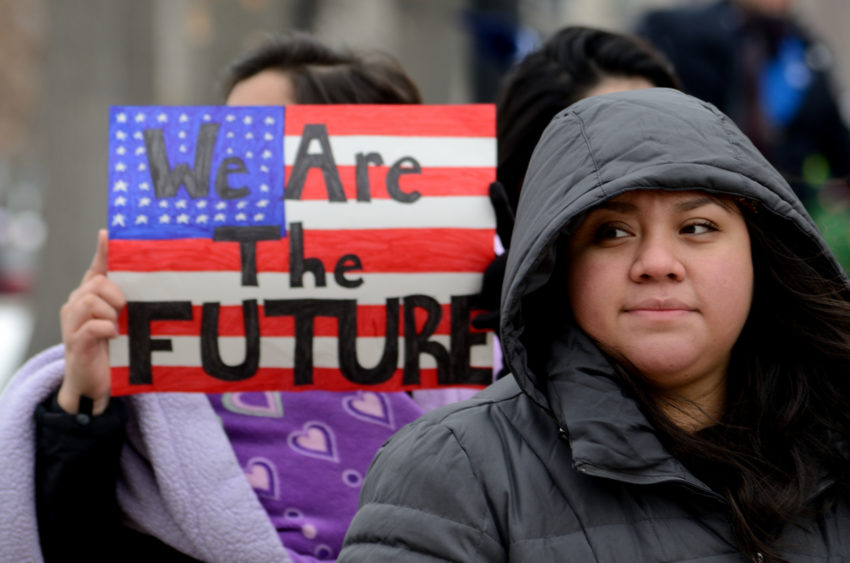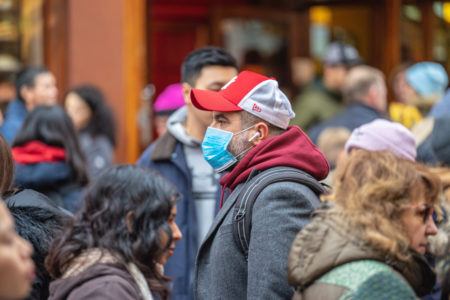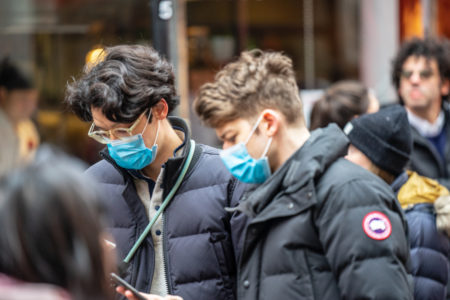
Share On Social!
Millions of unauthorized, taxpaying immigrants will not receive any financial support from the U.S. government through its recent stimulus package.
The Coronavirus Aid, Relief, and Economic Security (CARES) Act provided most Americans with $1,200—as well as an additional $500 for each child under 17—to provide some economic security in the wake of the pandemic. Still, undocumented residents who pay taxes using a taxpayer identification number did not receive any help.
Worse, children in that household, whether they are American citizens or not, won’t receive aide either — and these families are suing the government over this issue.
“The refusal to distribute this benefit to U.S. citizen children undermines the CARES Act’s goals of providing assistance to Americans in need, frustrates the Act’s efforts to jumpstart the economy, and punishes citizen children for their parents’ status — punishment that is particularly nonsensical given that undocumented immigrants, collectively, pay billions of dollars each year in taxes,” the Legal Director of Georgetown Law’s Institute for Constitutional Advocacy and Protection, Mary McCord, said in a statement.
With discussions of another relief package in full swing, activists, civic leaders say that immigrants and their families deserve much-needed relief.
Undocumented Residents Lack of Aide
The recently passed CARES Act provided the American people and the U.S. economy $2 trillion in various forms of financial relief.
Further legislation included the Paycheck Protection Program and Health Care Enhancement Act, which does not do enough for those most impacted, according to the League of United Latin American Citizens (LULAC).
As lawmakers debate the potential second stimulus package, advocates and community leaders alike are calling for greater protections for immigrant families.
Groups, such as the liberal think tank The Center for American Progress hopes a future stimulus package will provide:
- COVID-19 testing and treatment to all people in America regardless of immigration status
- The ability for mixed-status families to access economic support, such as the checks congress provided in their last bill
- A halt to unnecessary removals from the workforce regardless of permissions from the government
- Clear guidelines that diminish fears of immigration enforcement while using needed services, such as healthcare treatment

These efforts would provide families with much-needed security, according to Maribel Cruz, a Long Beach, California recipient of the Deferred Action for Childhood Arrivals (DACA) program.
“If they pass another stimulus package, they have to include everyone that’s living in the country,” Cruz told Vox. “I just hope that they don’t think of relief as a political tool. I just hope that they have some humanity in them to provide life-saving assistance to families.”
Still, this virus is hitting communities in need—such as people of color and low-income workers—the hardest. Despite those facts, many activists say the various levels of government aren’t doing enough to help those who need it the most.
“As Congress begins the latest round of negotiations, the human and moral focus should be to help those in most need,” LULAC National CEO Sindy Benavides said in a recent statement. “In the last few weeks we’ve seen an outbreak of the virus in an immigration detention center, the highest rates of layoffs and unemployment disproportionately affecting Latinos, delays in the USCIS asylum process, and millions of undocumented workers left without protections.”
In the U.S., there are roughly 7.6 million undocumented workers, according to the Pew Research Center. In total, Latinos make up 7 million of the 11 million unauthorized residents in America today.
This means, of all of the people that will face harsh circumstances at the hands of coronavirus, Latinos will experience an inability to work from home, job layoffs, and greater exposure to the coronavirus.
“Yet, it is precisely workers in the Latino and immigrant community, in every sector currently deemed ‘essential’ to our economy, who are risking their health every day for the well-being of our country,” LULAC’s Benavides states. “The least we can do to repay all workers for their sacrifices is to provide peace of mind that they won’t be separated from their families due to their immigration status and assurance that they will receive equal protection under the law.”
Undocumented Residents and Taxes
While some might assume that these workers do not contribute to the American economy because of their citizenship status, that is not the case, according to Zachary Mueller, Digital Communications Specialist for America’s Voice — an immigration policy group.
“Immigrants, including those without documentation, pay billions of dollars in taxes to federal, state, and local governments every year,” Mueller writes. “Immigrants paid $405.4 billion in taxes in 2017, including an estimated $27.2 billion in taxes paid by undocumented immigrants.
Immigrants have always been, and continue to be vital, to the United States — a country made up of immigrants.”
While there has been a variety of approaches to dealing with this problem economically—states such as Texas and Georgia have reopened despite some pushback from public health officials—it will be Latinos who are among the most impacted by local, state, and federal lawmakers’ choices.
Concerning Congress’ next stimulus package, advocacy groups are calling for legislation that will provide support for immigrants and their families. Specifically, LULAC is urging lawmakers to provide: 
- Financial assistance for ITIN filers
- Unemployment insurance relief for all workers
- Automatic extension of work authorizations for DACA/TPS holders
- Provisions to release detainees from immigration detention facilities
- Continued visa processing for immigrant workers
- Provisions for the temporary halt of all deportations
- Inclusion of the estimated 2-3 million farmworkers who feed the country
- Testing and treatment of COVID-19 for undocumented workers
“It’s undocumented workers that are still in the fields, still in the factories, still the janitors in the buildings, still looking for work as day laborers,” S.G. Sarmiento, the campaign director for the National Day Laborer Organizing Network, told CNN. “From a public health perspective, you cannot have an effective national response to a pandemic that excludes enormous segments of the population.
“That’s both illogical and immoral.”
Explore More:
Embracing ImmigrantsBy The Numbers
44
million
immigrants live in the United States



